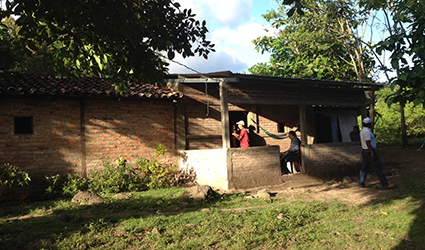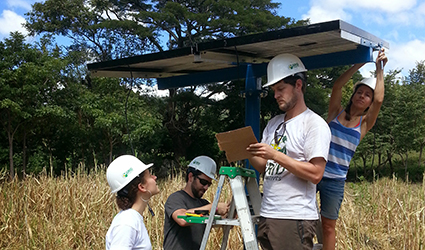 In May 2016, GRID Alternatives’ International Program volunteers installed a solar-powered drip irrigation system on a small farm in Jinotega, Nicaragua. Volunteers installed a solar-powered water pump that moves water from a water source into a tank, at which point gravity takes over to move the water through the tubes to the plants drip by drip.
In May 2016, GRID Alternatives’ International Program volunteers installed a solar-powered drip irrigation system on a small farm in Jinotega, Nicaragua. Volunteers installed a solar-powered water pump that moves water from a water source into a tank, at which point gravity takes over to move the water through the tubes to the plants drip by drip.
Small farmers in Nicaragua struggle to grow as many crops as their land allows due to a shortage of water for irrigation. While there is often plenty of water nearby, farmers do not have the means to bring the water to their farms since irrigation systems, pumps, and fuel are very expensive. Since small farmers often relying on rain to irrigate their crops, watering crops in the dry season is very hard and when there is a draught, crops in the rainy season also suffer. Drip irrigation systems can help famers dramatically improve their crop yields and crop diversity.
In addition to installing the solar-powered water pump, GRID Alternatives volunteers worked closely with farmers Nelson Rizo and Yara Zelaya and their children to set up the entire irrigation system including preparing the water storage tank, digging trenches for the irrigation tubes, wiring the load controller and mounting the PV modules.
 Agriculture continues to be one of the dominant economic sectors of the country. Subsistence farming is one of the most common livelihoods in the rural communities we work in Nicaragua. Many families have a small plot of land where they grow just enough food to consume like corn, beans and wheat and if there surplus they trade it or sell it at the market for other necessities. Drip irrigation systems provide water for fruit and vegetable crops to and help improve the lives of rural farmers by increasing crop production, saving the farmer time, and increasing income.
Agriculture continues to be one of the dominant economic sectors of the country. Subsistence farming is one of the most common livelihoods in the rural communities we work in Nicaragua. Many families have a small plot of land where they grow just enough food to consume like corn, beans and wheat and if there surplus they trade it or sell it at the market for other necessities. Drip irrigation systems provide water for fruit and vegetable crops to and help improve the lives of rural farmers by increasing crop production, saving the farmer time, and increasing income.
Small farmers face a number of challenges. Many farmers rely on diesel-powered or gasoline-powered motors to pump water to their crops, which is very costly, polluting, and time consuming for the farmer to travel to obtain fuel. Those who cannot afford a generator, irrigate their crops by hauling water in buckets by hand from a well or nearby river. In both cases, watering crops in the dry season is difficult due to the hot climate and lack of water accessibility, limiting the farmer’s annual yield.
Connecting to grid electricity is not an option for most farmers either because the electric grid is not nearby or because the electric company charges farmers a higher commercial rate if the electricity is used for irrigation.
By using solar-powered drip irrigation systems, farmers can save money, use water more efficiently, increase crop yields, reduce local pollution, add more locally produce to the market, improve the quality of their lives by having more disposable income to send their children to school, make improvements to their home, and get their crops to the local market faster.
Using a drip irrigation system also allows farmers to grow a wider variety of crops during dry season (May through October) like grenadine, papaya, passion fruit, cucumbers, tomatoes, carrots, sweet peppers and watermelon. Drip irrigation allows for greater flexibility for crop rotation cycles without damaging the soil.
While in the rural community, the group participated in cultural activities to better understand the “campesino” way of life. Before and after the solar project, the group traveled around the country to explore Nicaragua's scenery and experience various aspects of Nicaraguan food, music and culture.
To see photos from this project, click here.

